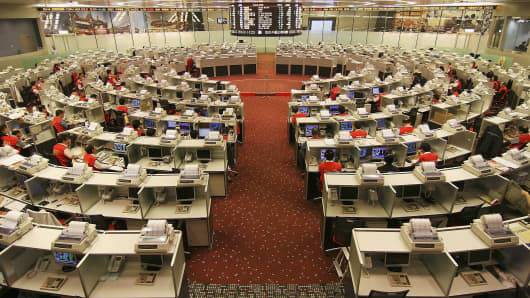Foreign investors will from next week be able to
short sell select mainland Chinese shares via the Hong Kong-Shanghai
trading link, the latest in a series of regulatory moves to open China's
markets to overseas capital.
The eligible shares are equivalent to nearly three-quarters of mainland stocks listed under the Stock Connect trading scheme, the Hong Kong Exchanges and Clearing said in a statement.
The daily volume of short positions on a stock would be capped at 1 percent, and at no more than 5 percent over 10 consecutive days, the statement said.
Read MoreShanghai-HK stock connect: What you should know
Despite the limits, traders said the new rules are likely to encourage hedge funds and other investors to use Stock Connect, which was launched in November and allows
foreign investors to directly trade Shanghai shares from Hong Kong.
The trading curbs, as well as other outstanding technical hurdles, would have to be removed, however, if China wants to be included in the benchmark MSCI emerging market index, a move that would help attract hundreds of billion of dollars of investments from global index-tracking funds.
The eligible shares are equivalent to nearly three-quarters of mainland stocks listed under the Stock Connect trading scheme, the Hong Kong Exchanges and Clearing said in a statement.
The daily volume of short positions on a stock would be capped at 1 percent, and at no more than 5 percent over 10 consecutive days, the statement said.
Read MoreShanghai-HK stock connect: What you should know
Despite the limits, traders said the new rules are likely to encourage hedge funds and other investors to use Stock Connect, which was launched in November and allows
foreign investors to directly trade Shanghai shares from Hong Kong.
The trading curbs, as well as other outstanding technical hurdles, would have to be removed, however, if China wants to be included in the benchmark MSCI emerging market index, a move that would help attract hundreds of billion of dollars of investments from global index-tracking funds.
Jimmy Weng, who manages a $60 million portfolio at hedge
fund Genesis Capital Investment Limited, said he now envisaged
increasing the fund's exposure to mainland Chinese stocks, or A-shares, to up to 20 percent this year from zero last year.
"We didn't participate in the A-share market last year because of the lack of hedging opportunities, and because it was more liquidity driven than fundamental," Weng said. "But as there are more short sell opportunities we'll look at it more."
Short-selling involves investors borrowing and selling shares they do not own, betting their price will fall, in the hope of repurchasing them at a lower price and making a profit. It also allows investors to better hedge their positions.
Traders said the impact of the short selling move would not be immediate, as the current weak volumes on Stock Connect constrain the amount of shares available for shorting.
The launch of Stock Connect is a key plank of Beijing's strategy to bring long-term foreign investors into its equity markets to reduce volatility and improve corporate governance.
Daily trading volumes via the scheme, however, have remained lackluster, due mainly to regulatory and technical hurdles that make the scheme unappealing to many institutional investors.
"Allowing short selling is another step towards potential inclusion in the MSCI indexes but in my view that is far outweighed by other concerns that funds still have," said a desk analyst at a large foreign brokerage in Hong Kong.
"We didn't participate in the A-share market last year because of the lack of hedging opportunities, and because it was more liquidity driven than fundamental," Weng said. "But as there are more short sell opportunities we'll look at it more."
Short-selling involves investors borrowing and selling shares they do not own, betting their price will fall, in the hope of repurchasing them at a lower price and making a profit. It also allows investors to better hedge their positions.
Traders said the impact of the short selling move would not be immediate, as the current weak volumes on Stock Connect constrain the amount of shares available for shorting.
The launch of Stock Connect is a key plank of Beijing's strategy to bring long-term foreign investors into its equity markets to reduce volatility and improve corporate governance.
Daily trading volumes via the scheme, however, have remained lackluster, due mainly to regulatory and technical hurdles that make the scheme unappealing to many institutional investors.
"Allowing short selling is another step towards potential inclusion in the MSCI indexes but in my view that is far outweighed by other concerns that funds still have," said a desk analyst at a large foreign brokerage in Hong Kong.


No comments:
Post a Comment